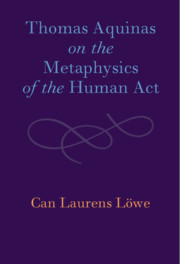Book contents
- Thomas Aquinas on the Metaphysics of the Human Act
- Thomas Aquinas on the Metaphysics of the Human Act
- Copyright page
- Dedication
- Contents
- Figures and Tables
- Acknowledgments
- Abbreviations
- Introduction
- Part I The General Framework
- Chapter 1 What Is a Human Act?
- Part II Choice Hylomorphism
- Part III Act Hylomorphism
- Appendix Judgment and Composition and Division
- Bibliography
- Index
Chapter 1 - What Is a Human Act?
from Part I - The General Framework
Published online by Cambridge University Press: 25 June 2021
- Thomas Aquinas on the Metaphysics of the Human Act
- Thomas Aquinas on the Metaphysics of the Human Act
- Copyright page
- Dedication
- Contents
- Figures and Tables
- Acknowledgments
- Abbreviations
- Introduction
- Part I The General Framework
- Chapter 1 What Is a Human Act?
- Part II Choice Hylomorphism
- Part III Act Hylomorphism
- Appendix Judgment and Composition and Division
- Bibliography
- Index
Summary
This chapter analyzes the key notion of the “human act” (actus humanus) around which Aquinas’s action theory revolves. It argues that, for Aquinas, the general term ‘act’ is used broadly to denote any power-exercise in nature, whether in the animate or the inanimate domain. Given this broad scope of the term ‘act,’ the chapter considers, in a next step, what sets human acts apart from other power-exercises. It argues that, according to Aquinas, one differentiating feature is that a human act is a hylomophically organized composite of two power-exercises, where a volition that he refers to as “use” is the formal component and a power-exercise caused by volition that he refers to as the “commanded act” is the material component. However, as the chapter also shows, Aquinas chiefly relies on an aetiological criterion to differentiate human acts from other power-exercises, arguing that a human act is explained by a preceding act of free choice. It then shows that choice likewise displays a hylomorphic structure, for Aquinas. It is a volition materially speaking, and its form is the preferential character that this volition inherits from a preceding judgment that Aquinas refers to as the “judgment of choice.”
Keywords
- Type
- Chapter
- Information
- Thomas Aquinas on the Metaphysics of the Human Act , pp. 11 - 34Publisher: Cambridge University PressPrint publication year: 2021



